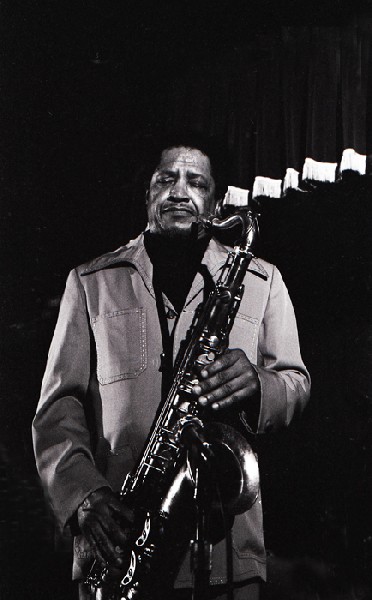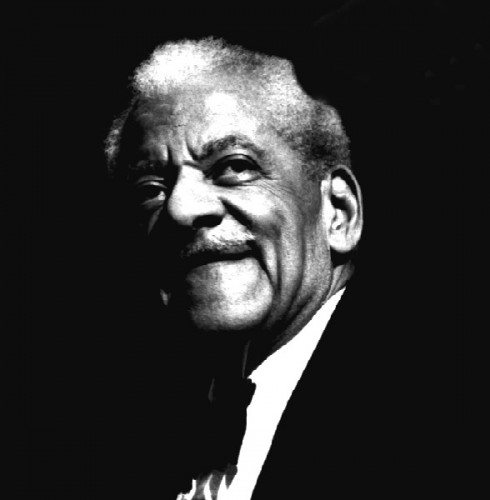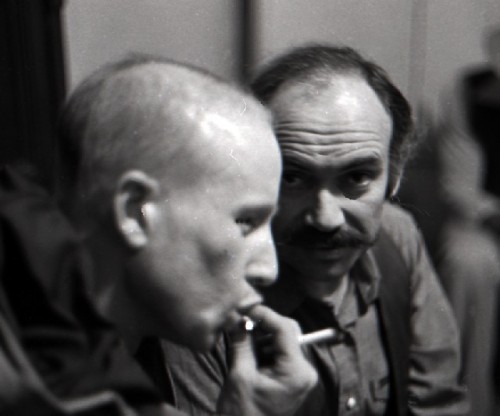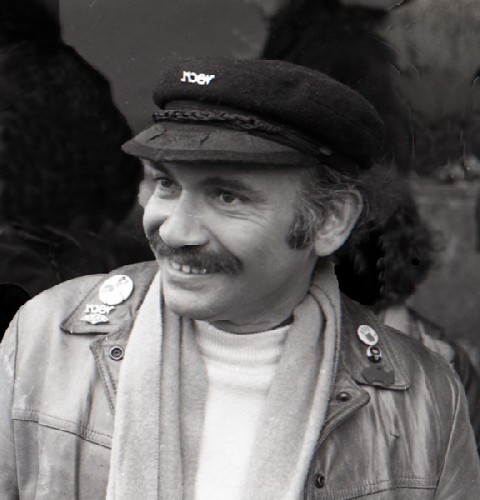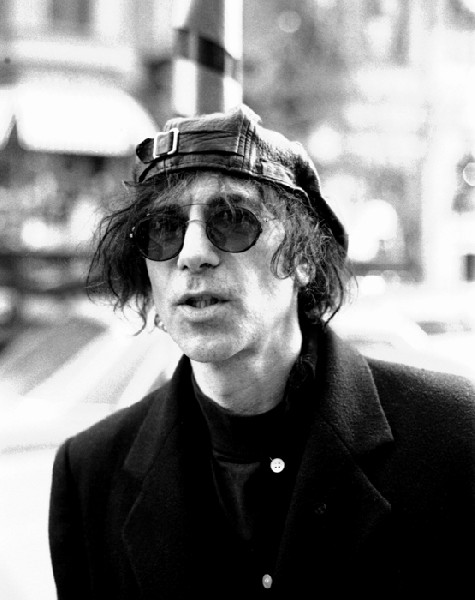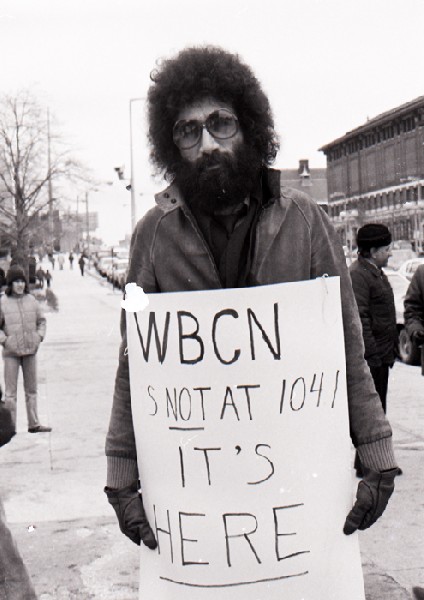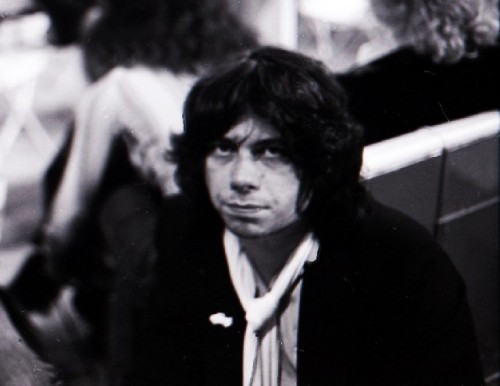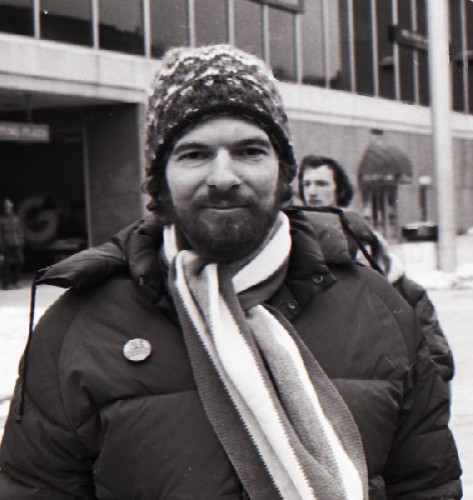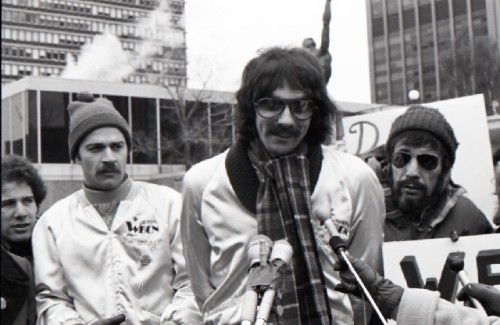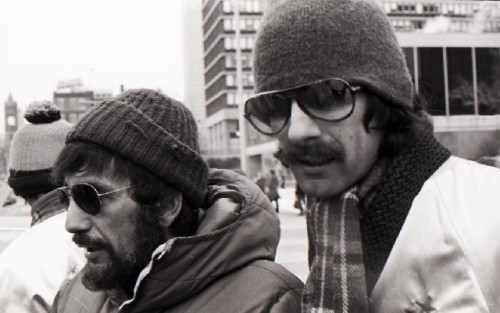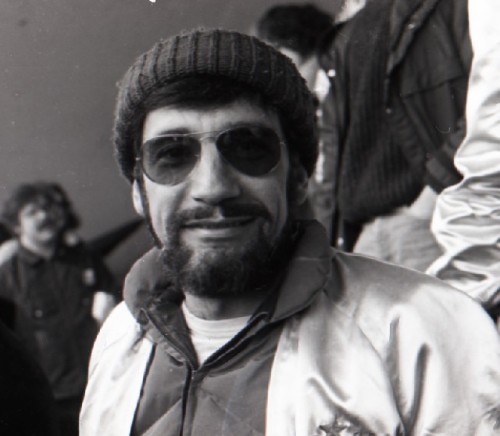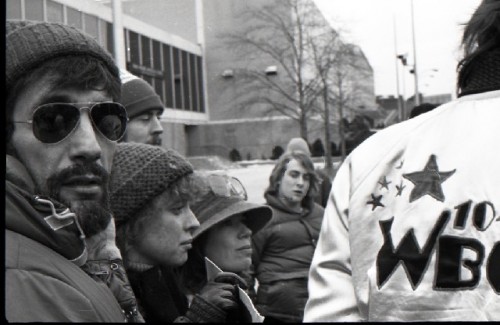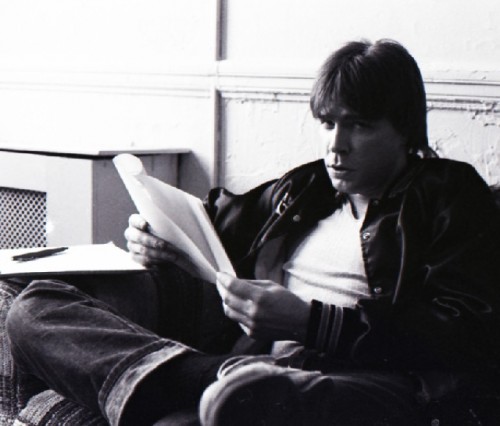Ron Della Chiesa Voice of the BSO One
Early Years at WBCN
By: Charles Giuliano - May 17, 2011
Charles Giuliano I am contacting you about an ongoing series of dialogues on the arts and media in Boston from the 1960s on. Last week I spoke with George Wein about Storyville and the Newport Jazz Festivals.
Ron Della Chiesa I hosted those for years. He always had me there opening night at the Casino. Unfortunately now that I’m doing the BSO broadcasts I’m at Tanglewood. We went through so many great evenings at the Casino with Bobby Short, Count Basie, Dianna Krall, Tony Bennett. It was wonderful.
CG You’re working on a book?
RD I hope to have it out by the end of the year. It’s called Radio My Way.
CG Somebody called me and asked for permission to use a photo of you.
RD That’s right with Dick Johnson. So you’ll be in the book with Dick.
CG This past winter I worked on my photo archives scanning and tweaking images with Photoshop. The images go back decades and many were shot with available light in nightclubs. I have a great shot of Illiniois Jacquet at Lulu White’s.
RD I remember that gig so well. I knew Jacquet.
CG Of course, you knew everyone. You were close to Dave McKenna and Teddy Wilson.
RD Very close to Dave. I used to hang out with Teddy Wilson. He said “Ron you have so many lovely women around you.” Teddy was a very elegant urbane guy. He was something else.
CG You had a schizophrenic life.
RD Yeah, I did. That’s a good way of describing it.
CG You’re involved with classical music but also dedicated to jazz.
RD No question about it. I crossed over. It had to do with my early days which I talk about in the book. My father was a renaissance man, a painter and artist. I was an only child. He played opera at home. That was my introduction to music listening to tenors Gigli, Caruso on the old victrola. I listened to the NBC broadcasts with Toscanini. That’s how I came into the world. I took some trumpet lessons for awhile. The jazz thing kind of grew out of that and then the film thing and Broadway. Little did I know that I would end up hosting the Boston Symphony Orchestra. I’ve been doing it for 20 years now with the same crew and engineer.
CG Who preceded you?
RD William Pierce. Remember him that very Brahmin guy.
CG We were in the GBH studio one time to do a Music American broadcast. He walked in. You turned to me in a whisper and said “That’s the voice of the BSO.” Who knew it would be you one day.
RD Before him of course there was Milton Cross. He was the voice of the Met Opera and one of my early idols. He was on for 50 years and then when I went on to GBH I met William Pierce who was right out of that school. That avuncular style. He was a very erudite gentleman.
CG Another of your colleagues was Robert J. Lurtsema.
RD Absolutely. I knew him very well. He was the master of the pause.
CG I recall you telling me of a time when he was delayed getting in for his show. He called you and said “Ron, start the birds.”
RD You’ve got a good memory Charles. That’s absolutely true. He said “Do not go on the air if I’m late. If you go on the air people will think something has happened to me.” So I put the birds on and they ran for about twenty minutes. That was in the middle of a huge blizzard and he made it in. I’ll never forget him standing there looking like the abominable snowman.
Just to digress I have turned 73. I was at your 40th birthday party. We were all in your Cambridge apartment (5 Line Street around the corner from Savenor’s Market) and you raised your glass and offered a toast “Here’s to death.” So we made it. Right?
CG Who knew.
RD Joyce and I are very comfortably living in Dorchester. We left the South End after some 25 years.
CG I helped you move in. We moved your record collection with your friend Walter. Then we had dinner in Cambridge at the Turtle Café which Joyce was running.
RD You did. Do you still have your vinyl?
CG I have 7,500 LPs.
RD Were do you store them?
CG We had shelves built in the loft and they are in the bedroom alphabetized in categories. The past two winters I have been transferring them to the hard drive in I Tunes. Then I can make mixes and burn CDs. I have been sharing them with friends and turning them on to my taste in jazz. It’s a slow process but very rewarding to listen again to all that music and have it stored and accessible.
Let’s talk about your early years in broadcasting and WBCN.
RD My beginnings at BCN started in 1961. I had just come out of the Army and graduated from Boston University School of Communication. I worked at a ship yard in Quincy during the day. At night I had a part time gig. Arnie Ginsburg hired me to work at WBOS. It was an ethnic radio station on Comm Ave up from BU where Cadillac Olds used to be. It was a really antiquated studio. You went up a fire escape to get in there. I did the ethnic radio shows from 6 to 10 at night and Arnie Ginsburg came on with his Night Trane show as Woo Woo Ginsburg.
CG He was Boston’s first rock DJ. My sister who was three years older than me was a fan and called in requests.
RD He was the first. Arnie is on the cover of a new book on Boston radio. In 1961 I got an offer to go to BCN. The program director at that time was Don Otto. He was a BU alumnus. I sent him a tape and resume. My father drove me in because I wasn’t sure about getting around in Boston. I worked Christmas Day for the first time. It was at 171 Newbury Street in Boston on the fourth floor in an attic studio. They had a little record library and everything was confined to one room. The UPI machine was outside the studio. It was all classical. It was created by T. Mitchell Hastings a pioneer in FM. He knew Major Armstrong. I don’t think he knew Marconi. But he went way back there. He had a vision of a classical music network all across the country. He had HCN in Hartford. NCN in New York XCN I think was in Providence. He even owned MTW which was on top of Mt Washington in New Hampshire.
We didn’t have satellite but we had bicycles. We recorded everything on huge ten inch reels. We would just send them to different stations in what we called the bicycles system. Sometimes the problem was that the announcer didn’t stop the tape so you could hear local weather. It was what we called a cluster fuck. I was riding through Connecticut and it was like July. Just as I came in contact with the HCN signal out of Hartford I hear “God bless ye merry gentlemen…” They were playing Christmas music. They had the wrong tapes up and nobody was there.
Hastings was a visionary and he did go through some difficult times financially. Then a guy named Ray Riepen, this was around 1968, started something called The American Revolution. They hired Charles Laquidara, Sam Copper, Mississippi, all those guys came in.
CG The first DJ was Peter Wolf.
RD Peter was actually on the air from the Tea Party and I introduced him. We were a mixed format. We played classical during the day and then we would go to the Tea Party at night.
CG He had a midnight show.
RD Yeah, I introduced him. I’d be playing Stravinsky and then we switched over to him.
CG Hastings didn’t want rock on Newbury Street. He was afraid about having hippies walking into the building.
RD At that time everyone was high, smoking shit, it was wild. We were very conservative. So we went from the most conservative format to the most radical format. At that time I had started part time at GBH in the television booth. I would replace William Pierce when he went to Symphony. Then I crossed over into radio full time. It was perfect timing as I had no future at BCN. That wasn’t my bag. In 1968 I joined GBH full time.
CG Let’s got back to Hastings. You told me that he was experimenting with different formats from sports to all talk.
RD No he never went all talk. He always stayed with music but he went into easy listening.
CG Didn’t he do religious?
RD Yeah, in the mornings. The religious programs paid the bills. He had a guy named John DeBrien from the Ruggles Street Baptist Church who did a thing called Song Time. Then he had a thing with Brother Mandes who was a faith healer from Blackpool, England. A lot of screw ups would happen. You would get the back side of a four track machine. You would start with “Our Father” and get beeennnnweeere. Things would happen there. But that paid the bills. His mission was to be the Classical Music Network so we were still all classical.
CG You told me about how he hired a program director who divided all of the albums into boxes labeled Fast, Medium and Slow.
RD. That’s right. His name was Marlon Taylor. He took all the albums by André Kostelanetz , Percy Faith, Montovani. Later JIB developed that into an Easy Listening format. He had a flow chart system and the selections were marked slow, medium slow, medium fast. There was a card you pulled out and you had to follow a medium with an ms and so on. Naturally it was just a complete disaster. Hastings experimented with that for about a year. He also tried an early automation system. It was developed around 1966. It was a carousel rack. It played tapes and was a kind of automatic device. It inevitably screwed up and stopped so there would be dead air for hours. Hastings bought that at one of the early radio trade shows in Vegas. Later on when BCN went to rock they bastardized and ripped that machine apart and used it to play eight track tapes. There was a guy who slept at the station and Hastings paid him a day rate and a sleep rate.
CG Did you like Hastings?
RD I did. He was a kind man but he was really out there. He believed in Edgar Cayce and the Lost Continent of Atlantis. He was in touch with the spiritual world. He was a visionary and in many ways a genius. He developed one of the first FM car radios. A stereo car radio. He went to Harvard.
CG Of course his ship came in when BCN went all rock.
RD He tried to find a niche for me. He wanted me to be the public service director but I could see that wasn’t going anywhere. They weren’t doing any public service. Just smoking a lot of shit and having a ball.
CG Did you have any interaction with Ray Riepen?
RD A little bit. He was kind of a shit kicker from down South.
CG Kansas.
RD He could see how vulnerable things were and he could see the writing on the wall. Mitchell’s station was in a financial quagmire. I remember when we didn’t get paid for a couple of weeks. He knew there as an opening for this kind of music.
CG What happened to the stations?
RD They were sold off individually.
CG So BCN was the last one.
RD Yeah but Mitch was a part of the station until Infinity Broadcasting bought the station.
CG That’s when they had the strike.
RD That’s right but I was long gone by then. Kenny Greenblatt was around and Jack Carney. Charles Laquidara who is not retired and living in Hawaii. Living like a king.
CG Mark Parenteau has been on a government vacation.
RD A lot of this is in my book by the way. I talk about those early days.
CG Who is publishing it?
RD Pierson publishing. They mostly do textbooks. I had a friend there Bill Bart. He was a big jazz fan and he decided to put it out. I have a co writer and her name is Erica Ferensik. She writes fiction. I met her and we bonded. A year and a half ago we collaborated because as you know I’m not a writer. She writes like I would if I could write. She’s very funny and writes great satire. We collaborated for about a year and a half on this thing. She taped a lot of me and interviews I used on GBH. Everybody from Pavarotti to Jacquet, Mel Torme, Dizzy. All the people who came to my studio I recorded them. I made cassettes and I kept a lot of those. The book has 44 profiles. I could have done 300 but I had to narrow it down. It’s a broad spectrum of people I interviewed even Chuck Jones is in there. He’s the guy who created Bugs Bunny. David Raksin. He wrote Laura, The Bad and the Beautiful, one of the foremost film composers. Gunther Schuller is in there. Harry Ellis Dickson.
CG So it goes back and forth between jazz and classical.
RD Yeah, it reflects what I did during an era of Boston radio so it is all encompassing. It’s an eclectic mix.
Part Two


